Djibouti Projects is developing hotel La Grande Ghoubbet. This facility will be a combined project with The Lac Assal Wellness Centre.
2014 in review
The WordPress.com stats helper monkeys prepared a 2014 annual report for this blog.
Here’s an excerpt:
A San Francisco cable car holds 60 people. This blog was viewed about 2,400 times in 2014. If it were a cable car, it would take about 40 trips to carry that many people.
Welcome to Djibouti Guidebook. Where are you from?
Western Interferences
When the last week of my stay in Djibouti arrived, a feeling of pressure, stress and restlessness took over. Besides a short trip to a closed Zoo just outside of town, I hadn’t leave Djibouti-city yet to explore some of the beautiful natural sides. I wanted to see the promising but impassable places as Lac Assal, Lac Abbé and Moucha Island and I desperately tried to find possibilities to get there. But it soon became clear that an excursion to any of those places would be way too expensive for me alone, that my new friends weren’t too excited to drive me all the way to there and that most of the people in Djibouti only had access to cars which weren’t suitable for the bumpy roads that lead to these places. My mood switched to irritation and dissatisfaction for not being able to go to these spots but what exactly was I mad about here? My irritations came from expectations and weren’t they social-culturally determined? Why did I think that I had the right to expect ‘Western’ services and facilities in a country that in all aspects is so different from the world that I am used the live in?
Already since the 16th century the Western culture developed the annoying habit of teaching the rest of the world better and this habit is still present on all kinds of levels today. Did the seemingly ambitious and so called ‘world improving’ projects of Western countries in Africa not almost all lead to problems and misery in the end? What would the world have looked like today if the Western nations had never interfere with African countries and if instead of the uncontrollable lust to power, acceptation and appreciation towards one another had been part of human nature?
After talking to many foreigners living and working in Djibouti I heard lots of complaints about the service, work ethics and the overarching comment that ‘you cannot get things done here’. Which is understandable since there is a big difference in backgrounds and cultures but on whose land were we? After all that the European societies have done to the African continent and its many tribes and cultures, why do we still have the feeling that whatever we do is of greater importance and generally better and superior to the actions and thoughts of the local inhabitants? We might feel that for example staring at the streets in front of you and chewing on Khat leaves for hours isn’t a decent way of spending your day but what makes us qualified judges? Aren’t we the fools here for being unable to find happiness in these ‘wasted’ moments? Has the western culture been so distracted by greediness, money and control that now we cannot estimate the value of our time anymore?
I came to Djibouti to research the possibilities to stimulate tourism to this tiny African republic and I definitely believe in the good that the mixture of cultures can bring. We cannot change that what happened in the past and we might not even be able the change the present situation with the dominance of the western wishes and expectations. But all that what Djibouti has shown me in a month time has changed my perspectives and ideas of the consistency in the world. I think that as members of the European Union we should finally drop our presumptuous attitude and be truly open to all the things that we can learn from the African nations. Because yet there is so much that we don´t know.
A Man’s Behavior in Djibouti
When I decided to go to Djibouti for my graduation research I was overloaded by warnings and worries from beloved ones back home. As a white girl alone in an unknown African nation I would apparently be a vulnerable and easy target for all these strangers with their bad intentions. Advantage would be taken of my naivety and kindness and I would be unable to understand my role as a woman in this society that culturally would be so different than mine. I had to understand that I couldn’t walk the streets alone at night, that I may not seek eye contact with a man for more than two seconds and that a fake wedding ring would function as my ticket to respect and acceptation.
Although listened to and having absorbed all these well-intentioned comments, I must say that since the moment I arrived here I more than ever experience all the advantages of being a woman; free dinners and taxi rides, flowers from local men, help whenever I need it, flattering compliments. And they all do not seem to want anything in return besides a smile and a nice, honest conversation. And it weren’t just the local Djiboutian guys that behaved so perfectly. Even the many expats working and living in Djibouti, 80% of them male, seemed to be escaped from a Disney fairytale.
Was respect, love and appreciation written in the Djiboutian air or was there another explanation for this gentlemen behavior?
Walking the streets of Djibouti-city every day I did notice all the beautiful local woman, dressed in colorful cloths and so called traditional Boubous. They definitely have a better sense of style than the average Dutch woman and their typical way of strutting the Djiboutian roads whereas their hips swaying slowly, gives them something charming and sensual. Fellows may turn their heads but many of these woman obey the rules of the Islam strictly. They might be more reserved and not so willing or interested in talking and laughing with strange men. These women often marry at an early age to which they attach high values. A lot of time and energy is put in making their marriage succeed and less attention and appreciation goes to meeting other guys, for whatever reason. Djibouti also knows a group of women who approach the Islam in a more modern way. They are financially independent and tend to spend many hours working, in the office or at home. They prefer to spend the little spare time that they have at home with family and close friends and throw a house party once in a while. They attend work related parties now and then, but those are for invites only and organized at work or in one of the luxurious hotels.
Another type of local women can be find after midnight, in the bars and nightclubs of the city. Their beauty is not inferior to that of the women described before, although their style and behavior seem to differ as night and day. Dressed in seducing and revealing clothes they try to attract and retain the attention of the, preferably white, man hoping they are tempted enough to spend the night with them in return for a little bit of money. Especially the new and short term expats enjoy this ‘carefree’ and accessible type of entertainment and talking about Djibouti as a prefect destination for sex tourism. But the men who stay longer or call Djibouti their homeland are starting to feel lonely and unloved. The solely physical needs that those women provide do not seem to be enough on the long term and their desire to a female’s perspective on matters or just a conversation without ulterior motives seems to grow desperately.
Growing up with sisters myself, and being surrounded by girlfriends and gay best friends most of the time, I have never understand a man’s mind, so I might be wrong about the reason of their behavior in Djibouti. But whatever it is, I believe more than ever that James Brown was right when he sang that this is a man’s world, but it wouldn’t be nothing without a woman or a girl.
Adjustments and The Authentic Feeling
Author Caitlin Leffel once said that it takes about 10 years to become a local in a metropolitan city as New York. By then, you will be able to feel and act like a true New Yorker and outsiders won’t be able to tell the difference between a ‘real born’ and a ‘moved in’ citizen. But what about a place as Djibouti, where cultures and nationalities are not as mixed and only an external characteristic as blonde hair or a white skin can betray your foreign roots.
After talking to many foreigners living and working in Djibouti, I realized that, even when they speak Somali fluently, dress like local people and adopt a typical ´Djiboutian attitude´, they are still treated differently and cannot help but feel like an outsider from time to time.
That is when I started to think about the wishes and desires of tourist, to get an authentic experience when they are in a foreign country. The market research agency Research International stated that visitors want to be surrounded by a different atmosphere and be integrated into a different culture when they are on vacation. This desire is, since 2009, growing. Although I am definitely one of those people and try to act and like to be treated as a true Djiboutian girl right now, I am not sure if the effort I put into achieving that will ever be truly rewarded. Is it a feasible wish to experience that ‘real local life’ when visible differences such as appearance and bodily responses restrain you from being treated as one? Can we really have that authentic feeling if we are unable or maybe not even willing to fully adjust to a different country and its culture?
Unreliable electricity and water, slow service, high priced products, unkept promises and appointments. After being in Djibouti for more than an average vacation period I started to see a downside of the country as well. On my way to different appointments I do not always feel like stopping to talk with interested local people and my body starts to pay the price from frequently switching from artificial air conditioned surroundings to the natural heat outside. But at the same time new friendships became deeper and more intimate, I rarely get lost anymore and I know exactly what bar prepares my vanilla milkshake just right. Was I adjusting here and became my feelings and behavior more comparable to those of the local Djiboutians or were things just no longer brand new anymore and was I still dragging my own cultural habits and expectations around in this foreign country?
Maybe most people, who say that they do want to experience life as a local but only have a relatively short time to spend abroad, do want to see typical local activities and sights and perhaps make some local friends. But in the end, when we are on vacation, we might want to skip the inconvenient local short comings and be not too much confronted with a painful difference in standard of living. Lots of tourist want to be entertained and would not be interested in seeing (foreign) inhabitants going to work every day or in seeing local people on the streets doing absolutely nothing.
Knowing many open and adventurous people myself I do know that there are tourists who actually are interested in experiencing these ‘real sides’ of a culture. But if you only spend the average of 8 days (source: cbs.nl) in your holiday destination, or even if you spend a longer time but don’t speak the language or your deviating physical appearance attracts too much attention, I don’t think we should be fooling ourselves by thinking we only have a slight idea of what it is like to be a local.
A Homey Feeling
According to the American social psychologist Nicolas Wade (2010) people are seeking for a sense of ‘feeling at home’ everywhere they are. As most important features associated with this feeling, he names connectedness, identity, possibility to withdraw and control. Wade his paper does not go into depth about reasons why people leave a stable homey feeling. The paper neither gives insight if what people are looking for during a holiday or long term stay abroad is a similar feeling as they are looking for back home.
After reading his research and being abroad myself at the moment I started to think about the reasons and desired feelings during an abroad experience. Cause isn’t it the distance to regularity, obligations and happenings back home that give you that true vacation feeling or does a desire to leave means that the home you are coming from failed in giving you the feeling it supposed to give you?
After being in Djibouti for only 4 days, the first thing I thought of to describe my experiences so far to my friends back home was that, although everything is different here and I do not even have my own apartment yet, I ‘felt at home’ already. The slow pace and open schedules of the locals make me feel relaxed, the uninterrupted sunny weather gives me a holiday feeling and the fact that I am travelling alone provides me freedom. At home I worried about safety and the dry desert climate but so far, I feel accepted and appreciated and the whole atmosphere gives me a pleasant, comfortable feeling.
According to Wade these are important elements needed to feel at home, and probably the reason why I used those words, but besides that, I feel completely different than when I am in Holland. Djibouti took away restlessness, some worries and pressure. Back home I cannot help myself but think about right decisions and future steps, which is not a bad thing, but I am happy I can let go of all of that so easy in this friendly and sun drenched African country, which to me makes it a prefect holiday destination.
I think in order to make a vacation successful and satisfying for tourists, a destination indeed has to have some of the main ‘feeling at home’ features of connectedness, identity and a possibility to find time for yourself. But that feeling needs to be mixed with relaxation, an ability of letting go of negative emotions and the destination needs to fill its visitors with happiness and joy.
In my opinion, if you can replace fear of the unknown and irritation to slowness for kindness, patience and acceptance, Djibouti can provide its guests this perfect mixture of a ‘Holiday Homey’ feeling where everyone is searching for on vacation.
High speed to île Moucha
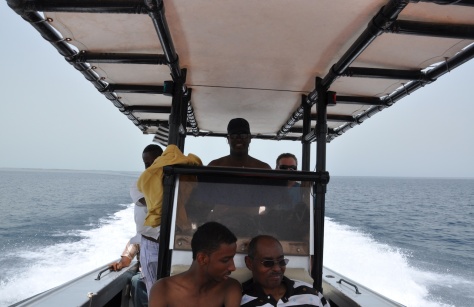
So we went to the islands in the Gulf of Tadjourah! île Moucha and île Mouskali are quite close to the harbor of Djibouti. That is to say: if you go by 200PS speedboat the trip will only take you about 20 minutes. We made a tour round île Moucha and then dropped the anchor to have a swim at Yassin’s favorite spot. The shallow waters are bright Turquoise here. When we looked a bit further there was a spot with beautiful coral and very colorful tiny fish. This is one of the most astonishingly beautiful spots in the world to swim, snorkel or dive. Try it ones!!
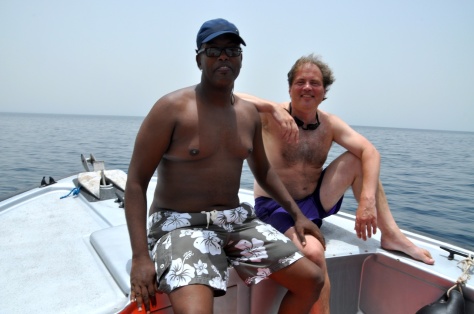
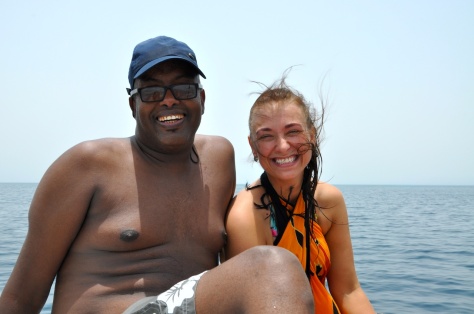
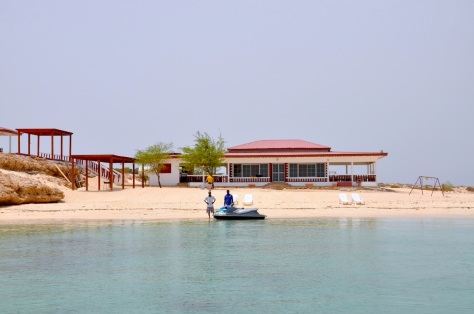
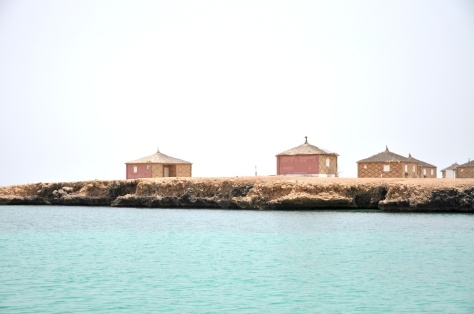
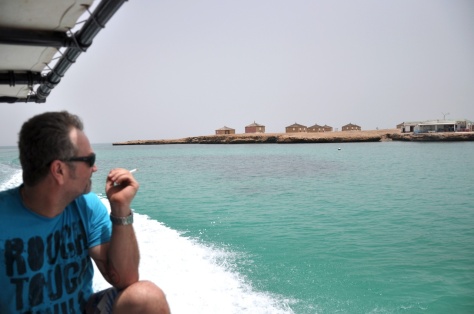
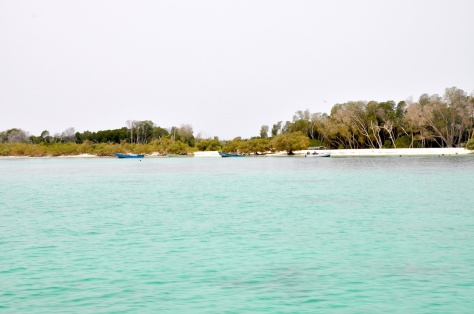
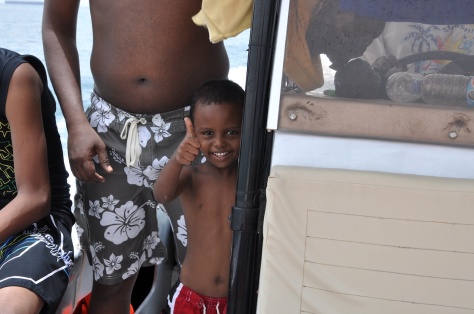
Ghoubbet al-Kharab
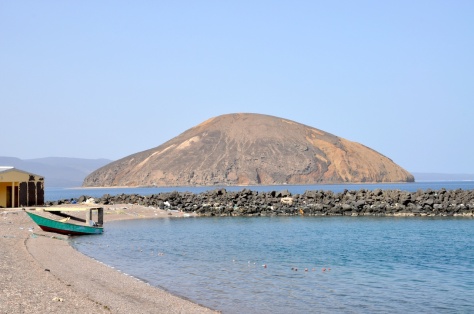
Ghoubbet al-Kharab (‘the abyss of the Demons”) is a Djiboutian cove separated by a pass with strong current to the Gulf of Tadjourah. Ghoubbet is surrounded by mountains and cliffs of 600 metres high, as well as by the Ardoukoba volcano that separates it from Lake Assal. It is very deep (200 metres) and hosts many fish and sharks that fight the strong currents of the Gulf. This luxuriance attracts fishermen who make the road from the town of Djibouti. The cove is visited by divers and scientists like Captain Cousteau.
Between Ghoubbet al-Kharab and the port of the city of Djibouti, there may be up to one meter of difference at the level of the sea surface. This difference is due to the narrowness of the rapid, but also by the tides and winds.
In the middle of Ghoubbet al-Kharab, two majestic domes stand: les iles du Diable, the Devils islands. These are volcanic islands that constitute a pretty panorama.

Cathedral of Our Lady of the Good Shepherd
Cathédrale de Notre-Dame du Bon-Pasteur
Boulevard de la République, Djibouti
The modern architecture of the cathedral is a mixture of Roman Catholic tradition and local influence. As all churches, the alter is oriented to the East and the entrance to the West. In that way, brothers and sisters who visit the church can see the light of the upcoming sun through the stained glass of the absis, as a symbol of God. There is still a hint of a transept, if you look good. Absis, alter and crypt are located and shaped in a more traditional way.
The west facade has a local touch, with the filigrain on top and the very nice glittering effect of seashells processed in the concrete. Daylight falls in beautifully through backdrops in the walls.
Services are at 18:30 in the crypte from Monday till Friday. On Saturday and Sunday masses start at 18:00 in the cathedral. From June till September all services are being held in the crypte.

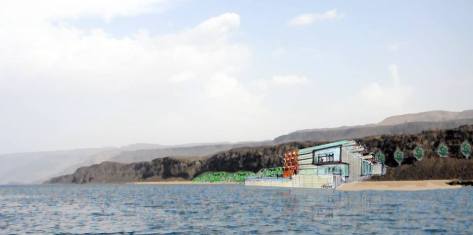

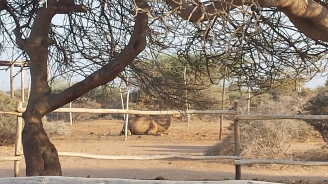

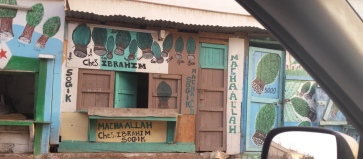
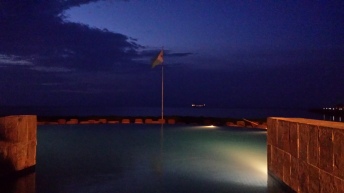
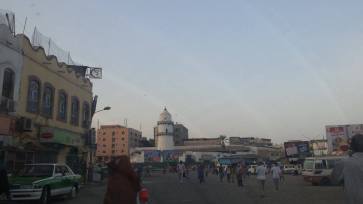
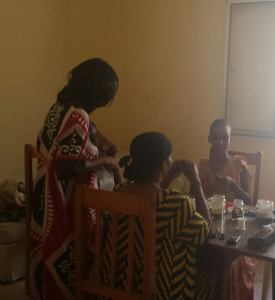
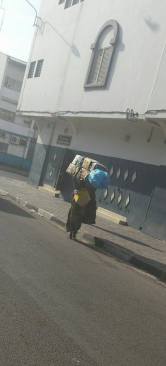
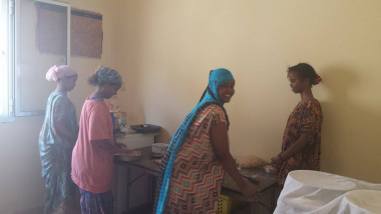
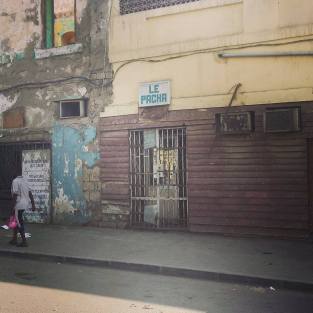
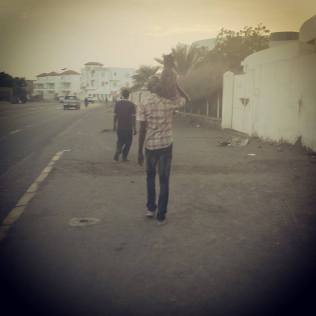
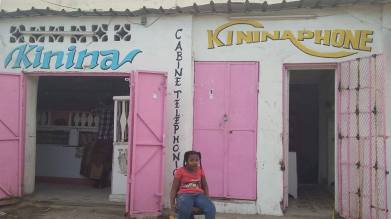
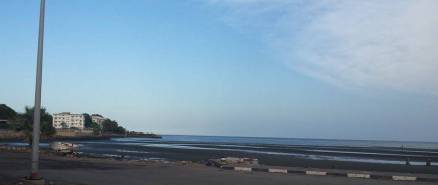
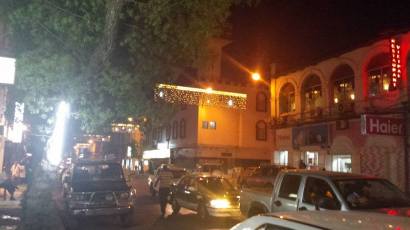
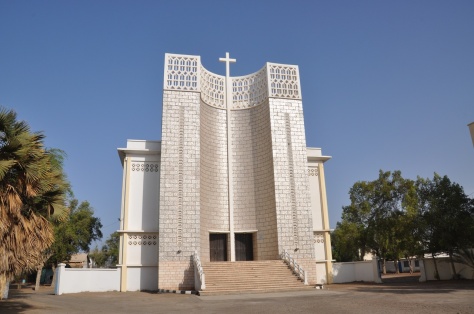
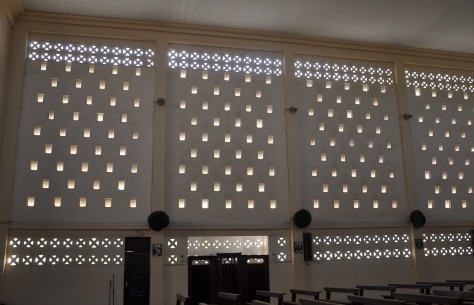
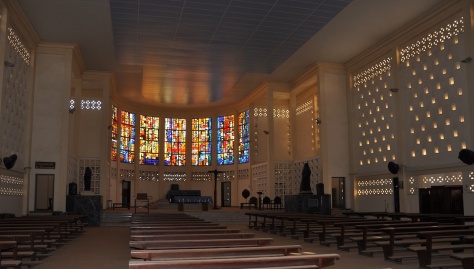
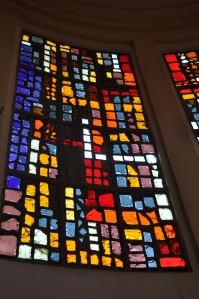
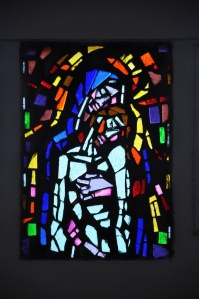
You must be logged in to post a comment.